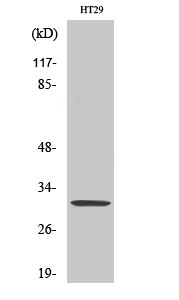
| WB | 咨询技术 | Human,Mouse,Rat |
| IF | 咨询技术 | Human,Mouse,Rat |
| IHC | 1/100-1/300 | Human,Mouse,Rat |
| ICC | 技术咨询 | Human,Mouse,Rat |
| FCM | 咨询技术 | Human,Mouse,Rat |
| Elisa | 1/5000 | Human,Mouse,Rat |
| Aliases | IL5; Interleukin-5; IL-5; B-cell differentiation factor I; Eosinophil differentiation factor; T-cell replacing factor; TRF |
| Entrez GeneID | 3567; |
| WB Predicted band size | 30kDa |
| Host/Isotype | Rabbit IgG |
| Antibody Type | Primary antibody |
| Storage | Store at 4°C short term. Aliquot and store at -20°C long term. Avoid freeze/thaw cycles. |
| Species Reactivity | Human,Mouse,Rat |
| Immunogen | Synthesized peptide derived from the Internal region of human IL-5. |
| Formulation | Purified antibody in PBS with 0.05% sodium azide,0.5%BSA and 50% glycerol. |
+ +
以下是3篇关于IL-5抗体的代表性文献摘要:
1. **"Mepolizumab for Severe Eosinophilic Asthma (DREAM): A Multicentre, Double-Blind, Placebo-Controlled Trial"**
- **作者**:Pavord ID, et al.
- **摘要**:该研究证实抗IL-5单抗美泊利单抗(Mepolizumab)可显著减少严重嗜酸性粒细胞哮喘患者的急性发作率,并通过降低血嗜酸性粒细胞水平改善症状(发表于《Lancet》, 2012)。
2. **"Reslizumab for Inadequately Controlled Asthma with Elevated Blood Eosinophil Counts: Results from Two Multicentre, Parallel, Double-Blind, Randomised, Placebo-Controlled, Phase 3 Trials"**
- **作者**:Castro M, et al.
- **摘要**:两项III期临床试验显示,抗IL-5抗体瑞利珠单抗(Reslizumab)可改善高嗜酸粒细胞哮喘患者的肺功能,减少急性发作,且安全性良好(发表于《NEJM》, 2015)。
3. **"Benralizumab for the Prevention of COPD Exacerbations"**
- **作者**:Bleecker ER, et al.
- **摘要**:抗IL-5受体α单抗贝那利珠单抗(Benralizumab)在慢性阻塞性肺病(COPD)患者中显著降低急性加重频率,但对整体人群效果有限,仅在嗜酸粒细胞亚组中显著有效(发表于《NEJM》, 2021)。
4. **"Anti-IL-5 Therapies in Asthma and Eosinophilic Granulomatosis with Polyangiitis"**
- **作者**:Wechsler ME, et al.
- **摘要**:综述总结了IL-5抗体(如美泊利单抗)在哮喘及嗜酸性肉芽肿性多血管炎(EGPA)中的疗效,强调其通过靶向嗜酸粒细胞炎症通路实现疾病控制(发表于《Nature Reviews Immunology》, 2020)。
以上文献涵盖IL-5抗体的关键临床试验及机制综述,聚焦于哮喘、COPD及罕见病治疗领域。
Interleukin-5 (IL-5) is a cytokine primarily produced by activated Th2 cells and mast cells, playing a central role in eosinophil development, activation, and survival. It binds to the IL-5 receptor (IL-5Rα/βc) on target cells, triggering signaling pathways that promote eosinophil proliferation and migration. Dysregulated IL-5 signaling is implicated in eosinophil-driven inflammatory diseases, including severe asthma, chronic obstructive pulmonary disease (COPD), eosinophilic granulomatosis with polyangiitis (EGPA), and hypereosinophilic syndromes (HES).
IL-5-targeted monoclonal antibodies, such as mepolizumab, reslizumab, and benralizumab, were developed to disrupt this pathway. Mepolizumab and reslizumab directly neutralize IL-5. preventing receptor binding, while benralizumab targets IL-5Rα, depleting eosinophils via antibody-dependent cytotoxicity. These biologics reduce eosinophil counts in blood and tissues, alleviating inflammation and exacerbations in asthma and other eosinophilic disorders.
Clinical trials demonstrated significant efficacy in reducing exacerbation rates, improving lung function, and decreasing oral corticosteroid dependence. IL-5 antibodies are generally well-tolerated, with common side effects including injection-site reactions and headaches. Their development marked a shift toward precision therapies for eosinophilic diseases, offering alternatives for patients unresponsive to conventional treatments. Ongoing research explores broader applications in eosinophil-related gastrointestinal, dermatological, and allergic conditions.
×